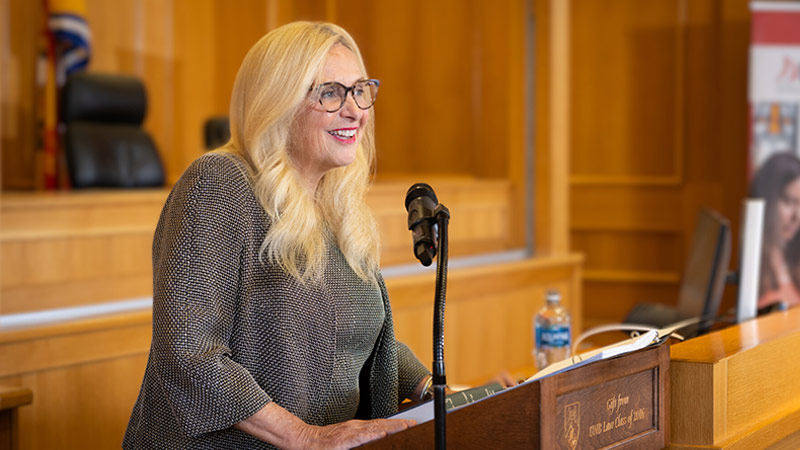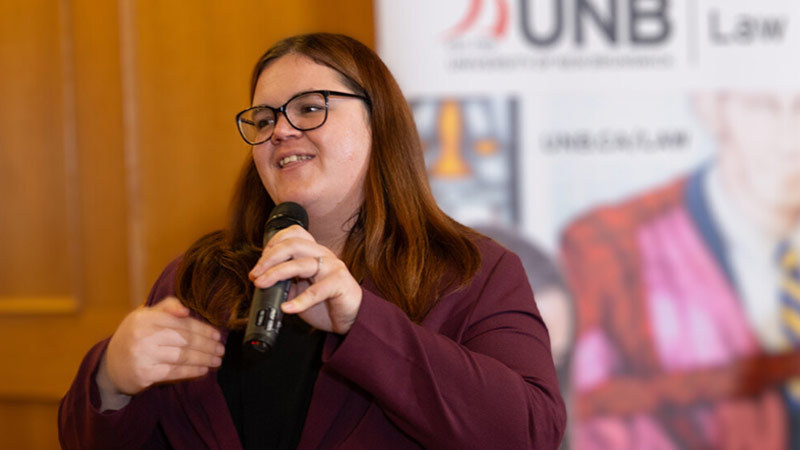'Complexity cannot be a reason not to tackle real problems. It should spur action.' A conversation with Supreme Court Justice Sheilah Martin
Author: Julia Belanger (JD’25) and Hilary Creamer Robinson
Posted on Nov 18, 2024
Category: UNB Fredericton

Interview by Julia Belanger (JD’25)
In late October, Justice Sheilah L. Martin of the Supreme Court of Canada delivered a powerful Viscount Bennett Memorial Lecture at the University of New Brunswick (UNB).
Justice Martin—whose distinguished career has spanned the roles of professor, barrister, trial court judge and now, Supreme Court justice—has examined complex and high-profile wrongful conviction cases, including that of David Milgaard and Thomas Sophonow.
In the following Q&A, third-year UNB law student and mother of four, Julia Belanger, asks Justice Martin to share insights on her motivations, career highlights and views on access to justice.
Belanger, originally from the Ottawa-Gatineau area, moved to New Brunswick to attend UNB’s faculty of law and will begin clerking for the New Brunswick Court of Appeal on her graduation in the spring of 2025. Through UNB’s Legal Innovation Lab and Pro Bono Students Canada she is addressing access to justice in New Brunswick and beyond.
Julia Belanger: Justice Martin, what motivated you to pursue a career in law?
JM: I had multiple motivations. The first time I got seriously interested in being a lawyer was after reading about the trial of Steven Truscott. I learned there was a possibility of system and human failure in our justice system. That was a shocking proposition to me as a teenager. I wanted to learn more and understand how a system meant to produce justice could produce the opposite.
I also wanted to make a decent living and have something that would sustain my intellectual curiosity.
Ultimately, I wanted to help people solve real-life problems that stood in the way of them being their best selves. I was motivated by trying to use law in a way that helped people have better lives.
JB: Has your perspective on access to justice changed since joining the Supreme Court?
JM: A person’s understanding of access to justice and equal justice for all changes over time and with experience. I’ve been a professor, a barrister, a trial court judge and now I’m at the Supreme Court. One thing you learn is the complexity of the issues. But complexity cannot be a reason not to tackle real problems. It should spur action.
We need to ensure the system is responsive to the user, which means focusing on the public and consumers.
JB: What is your favourite memory from your legal career?
JM: That’s a tough one, like picking a favourite child!
I guess I could say those days where I knew I worked very hard on something, was prepared, and could speak with authority because of my diligent preparation. Those days where it mattered that I was involved—where I felt I made a contribution—are my favourite memories.
It’s not just about winning but about the pride of a hard job well done.

JB: As someone who also has children, one thing you spoke about at the law lecture that really resonated with me was when David Milgard brought pizza for your kids after his release.
As a mother and someone who practiced law while raising children, what advice would you give to mothers entering the legal profession?
JM: First, I’d say, ‘Great choice!’
We’ve worked hard to make the legal profession more hospitable to women and mothers. From maternity policies to part-time work and income replacement, we’ve made strides.
My advice is to relax and not be harsh on yourself. Understand that you are doing two full-time jobs. Define your own balance.
JB: I remember when my daughter climbed onto my lap during a virtual meeting and fell asleep. Everyone thought it was adorable, and it showed me how much the profession has evolved to accommodate family life.
What suggestions would you give to men in the legal profession to support gender equality?
JM: Gender equality is about mutual respect and sharing life’s responsibilities. Encourage and support each other. Create circumstances where everyone has an equal capacity to do well. Understand that people have multiple obligations, whether to their children, parents or other important aspects of their lives. Structurally support this balance.
JB: What do you see as the biggest access to justice issue in Canada and how can the legal profession improve it?
JM: The biggest issue is that we’re renovating rather than innovating. We’re adding to a system instead of rethinking it from the ground up.
We need to create systems based on the needs of the people using them. Lawyers have the critical abilities to diagnose problems and argue for and against different models. We need the courage to make changes, experiment and see if they improve things. We should be bolder and open to new practices.
JB: Chief Justice Mark Richard often talks about the need for an inquisitorial system in family law instead of an adversarial one. It’s a great example of how we can look at something that’s not working and try something different.
Thank you so much for your time, Justice Martin. Is there anything else you’d like to add?
JM: Just to wish you well, Julia. You’re very impressive with all you do at UNB—your pro bono work and raising four children. Keep using your energy for good.
